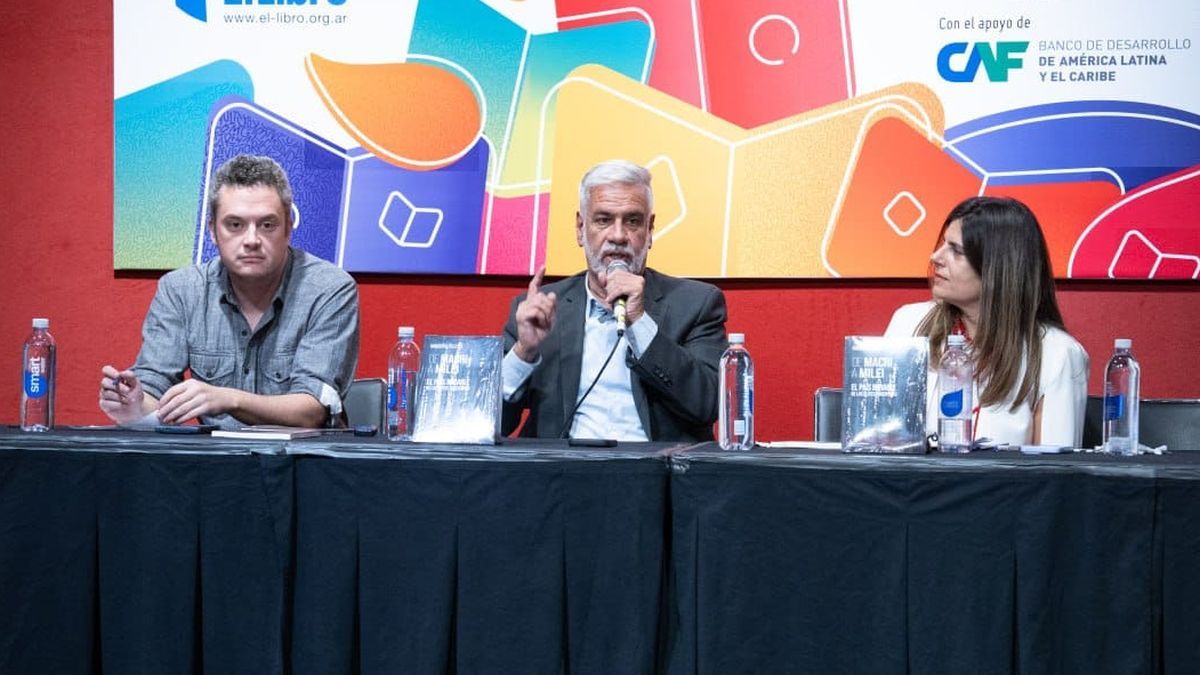The economist and leader of Peronism Roberto Feletti defined the current economic model as a “Debt and Permanent Fugue” scheme And he said that President Javier Milei “seeks to keep the last dollars of the Argentines mattress”. However, he warned that “this model has little time left.”
During the presentation of your book “From Macri to Milei. The unfeasible country of the Argentine elites” At the Book Fair, Feletti warned about the inability of the most powerful economically powerful sectors to build a sustainable society model and assured that it is something that happens since the return of democracy and with special emphasis on the last decade.
“The elites are behaving in a predatory way to such an extreme that they have practically put in discussion the viability of the Argentine and the nation institutions as such,” he denounced and added: “Capital accumulation logic based on valuing surpluses in the financial market and taking them out of the country systematically leads us to constant external crises.”
For the economist, “this is the most serious problem in Argentina and has to do with a bourgeoisie unable to give us a nation, which repudiates the country from which it obtains its resources and repudiates its currency.” From that reasoning, Feletti characterized the government of Javier Milei and Luis Caputo as the most finished expression of the voracious behavior of the elites.
Roberto Feletti questioned the model “of debt and permanent escape”
Along the same lines, he asked: “How can we be dilapidated by the US $ 18.6 billion of the commercial surplus last year, the U $ S 23,000 million of the money laundering, we ask US $ 12,000 million to the IMF and now Milei and Caputo require the Argentines to put the dollars of the mattress?”.
In that sense, he defined this Model as “of debt and permanent escape” And he warned that for that scheme the dollars are always few. “We cannot accept that this delicious country has half of its population under the poverty line,” he warnedand responsible for the dramatic social situation for the disinterest of the dominant sectors for the welfare of citizenship.
For this reason, he did not hesitate to ensure that, as it is raised, the current economic model has little time left, because “it is impossible to finance that level of indebtedness and permanent looting.”
For short -term economic priorities, Feletti stressed that Argentina must prioritize external solvency For the Central Bank to accumulate dollars instead of putting a fierce fiscal fiscal adjustment that has always been helpless to solve the structural problems of the country.
In this regard, he emphasized that “The crisis in Argentina is not a fiscal and the most palm example is this government, which have made a monumental adjustment and had to run to ask the IMF to ask more dollars because they went to the demon, since they did not meet reservations.”
In addition, he indicated that it is imperative to put an end to the huge indebtedness that the State suffers today and that mortgage the future of the next generations.
At the time of drawing a review of the last ten years of Argentina, Feletti highlighted Macri’s failure as another example of the unfeasibility of the model that advocate elites. “The most patarious example of the failure of conservative elites is Macri. He had the resources of a wished country, he was one of them (a member of the economic elite), had electoral legitimation and crashed her in three years. And he could not re -elect, an incredible thing. I say, not even (he could embody) the conservative approach to the Chilean model or the industrialist conservative approach according to the Brazilian model.
In that line, he warned that the Argentine elites have been unable to develop a project like that of their Brazilian peers, which, although they did it from a conservative matrix, consolidated a country with almost a century of sustained industrial policy and a solid macroeconomy. “How can Argentina have 10 times less reservations than Brazil and the Gross Product of Brazil does not become four times?”
Feletti about Milei and the discipline of Argentine economic groups
Before the auditorium of the Ernesto Sábato SalaFeletti said that Milei seeks to discipline local economic groups Through its subordinate association with the US: the objective is to promote a more determined participation in US capital present in Argentina.
At that point, he warned that, because these are complementary economies, the integration between the two countries was always unsuccessful. However, “Today there are possibilities that Milei manages to build a powerful block with US capital, articulating their interests with primary production as it rarely saw.” In this regard, he said that Treasury Secretary Scott Besent must be heard, who is the one who most explicitly raises this possibility.
As for the opposition programmatic agenda, he urged Peronism to build an alternative for the future and for that he called to consolidate political authority in the present as a necessary step to recover the government and, from there, rebuild “a strong state.” In addition, he considered that these actions are necessary to plan and implement a sustained development strategy for the next decades.
In international matters, Feletti called to resume the strategic association with Brazil Already recover a pragmatic foreign policy that prioritizes national interests and is not subordinated to ideological definitions that reduce Argentina to the pawn role of an alien board.
On the other hand, he called those present to understand the enormous risk of the weakening of the National State, which simultaneously produces the regionalization and territorial fragmentation of Argentina, with neoliberal logic and a certain risk of balkanization as never happened in modern Argentine history.
In that sense, invited the entire leadership of Peronism to rethink and converge in a serious federalismthat favors the development of all provinces, without exclusions, and that thus contributes to a more integrated and fair society.
On the other hand, Feletti thanked the vice governor of the province of Buenos Aires, Verónica Magario, and highlighted the ability to promote teams of the head of the Buenos Aires Senate: “Few leaders allow to develop a set of ideas, spread them and build teams with plurality as she does.” In addition, he celebrated the permanent incentive of Magario “to intellectual production and political debate.”
Source: Ambito




